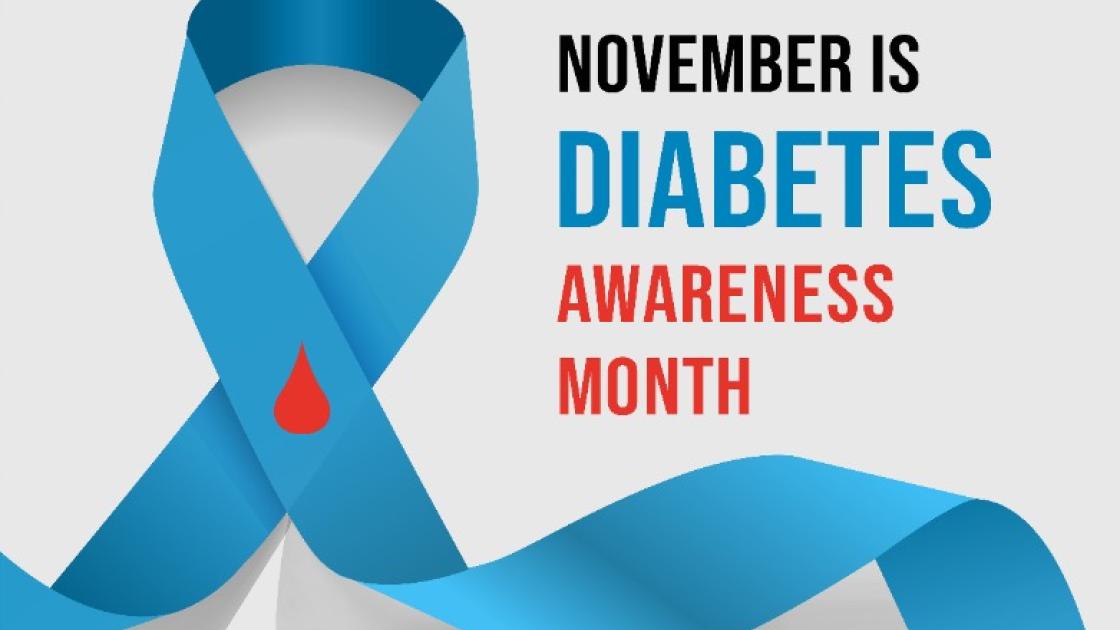
Learn the basics about diabetes
Have you or a loved one been diagnosed with diabetes?
SIU Medicine wants to increase awareness during American Diabetes Month by sharing some important information about diabetes. Keep reading to learn more about this all-too-common condition.
A diabetes diagnosis
Diabetes mellitus affects approximately 1 in 10 people in the United States. The percentage of adults with diabetes increases with age, occurring in about 30% of individuals ages 65 years and older.
Diabetes is serious. It is the seventh leading cause of death, the leading cause of blindness and kidney failure, and the second leading cause of amputation in the U.S. Diabetes is also a significant risk factor for heart disease and stroke.
Diabetes is diagnosed when:
- fasting blood sugar is equal to or greater than 126 mg/dL
- hemoglobin A1c, a marker of average blood sugar over three months, is equal to or greater than 6.5%
- blood sugar rises to 200 mg/dL or higher during a special procedure called an oral glucose tolerance test, or
- a random blood sugar measures 200 mg/dL or higher in individuals with symptoms such as frequent urination and thirst
Understanding diabetes
There are three major types of diabetes: type 1, type 2 and gestational. Type 2 diabetes is the most common and accounts for more than 90% of cases of diabetes. Gestational diabetes is a type of diabetes diagnosed during pregnancy. Blood sugars are persistently higher than normal in all types of diabetes.
Insulin is a hormone made by the pancreas, a gland in the abdomen. Insulin is the only hormone that moves glucose, the main type of sugar, from blood into other tissues such as muscles, the liver and fat. In type 1 diabetes, patients lose the ability to make insulin due to destruction of cells in the pancreas that make the hormone. As a result, patients with type 1 diabetes have a life-long need for insulin to manage their blood sugars. Type 1 diabetes is most commonly diagnosed in childhood and adolescence, though about 30% of new cases are diagnosed in adults older than age 18 years.
Type 2 diabetes occurs due to two factors: 1. Lack of normal response to insulin (“insulin resistance”), and 2. Falling insulin levels. Patients with type 2 diabetes continue to make insulin, but the amount of insulin is too little to maintain normal blood sugar levels. Most patients with type 2 diabetes are adults, though there is a growing number of adolescents with type 2 diabetes. Overweight/obesity and a family history of type 2 diabetes are important risk factors for the condition. There are many therapeutic options for managing type 2 diabetes, though 30-40% of patients require insulin to control blood sugars well.
Gestational diabetes refers to a new diagnosis of high blood sugar occurring in pregnancy. Many women are able to manage blood sugars with changes to diet, though some require oral medications or insulin to achieve their blood sugar goals. Gestational diabetes resolves after delivery, though women who experience gestational diabetes have a 40-50% lifetime risk of eventually developing type 2 diabetes.
Risk factors for diabetes
Both genetic and environmental factors contribute to the risk of developing diabetes. In type 1 diabetes, having a first-degree relative (parent or sibling) with the condition and non-Hispanic white ethnicity are significant risk factors. Individuals with increased genetic risk may develop type 1 diabetes after exposure to certain foods or viruses, though this remains an area of continued research.
Risk factors for type 2 diabetes are more clearly defined. They include:
- Family history of type 2 diabetes
- Overweight or obesity
- Increasing age
- Ethnicity or racial background, including African American, Hispanic American, American Indian, or Alaskan Native
- High blood pressure
- Sedentary (inactive) lifestyle
- High calorie “Western” diet
- Gestational diabetes
Signs and symptoms of diabetes
Most people with type 2 diabetes do not have symptoms of high blood sugars and may have a delay of a few to several years between onset of diabetes and when it is diagnosed. However, as blood sugars worsen over time, individuals may experience one or more of the following effects of high blood sugars:
- Excessive hunger, thirst and urination
- Increased fatigue
- Blurry vision
- Unexplained weight loss
- Sores, cuts and wounds that take a long time to heal
- Frequent infections
- Tingling or discomfort in the feet
Onset of type 1 diabetes is typically much more rapid and pronounced, with very high blood sugars causing frequent urination, thirst, hunger, blurry vision and fatigue. Some patients with type 1 diabetes experience a potentially life-threatening condition called diabetic ketoacidosis (“DKA”) in which both blood sugars and ketone levels are dangerously high.
Your health care provider may ask you to be screened for diabetes if you have risk factors for or signs and symptoms of the condition.
Treatment
Finding out you or a loved one has diabetes is worrisome. There is no cure for diabetes, but there are effective treatments for controlling blood sugars. For most patients, the goal of treatment is to keep hemoglobin A1c below 7%. If this goal is achieved consistently, the risk of eye, kidney and neurologic complications of diabetes is significantly reduced.
All patients with type 1 diabetes require a combination of rapid-acting insulin with meals and long-acting or basal insulin dosed once or twice daily to manage blood sugars and prevent DKA. There are several treatment options for type 2 diabetes other than insulin, though many patients with type 2 diabetes require insulin in combination with these medications or prescribed alone to control blood sugars. If you have diabetes, it's important to work closely with your physician and health care team to determine the right medications for controlling your blood sugars.
Have you or someone you love recently been diagnosed with diabetes?
Millions of people in Illinois are living with diabetes. If you have been diagnosed with diabetes, you have access to expert care through SIU Medicine. The SIU Division of Endocrinology has an American Diabetes Association accredited diabetes program staffed by endocrinologists, physicians who specialize in hormonal disorders including diabetes, dietitians and certified diabetes educators who help patients with complicated cases of diabetes. Reach out today to find a doctor who can help you manage your diabetes and feel more in control of your health.




